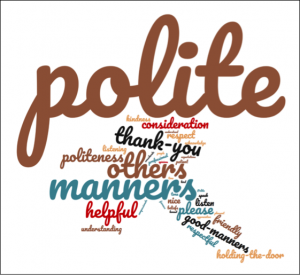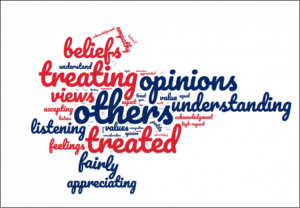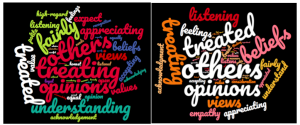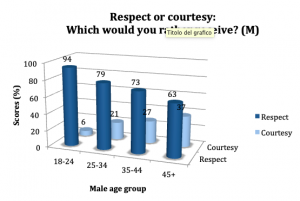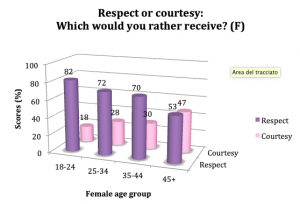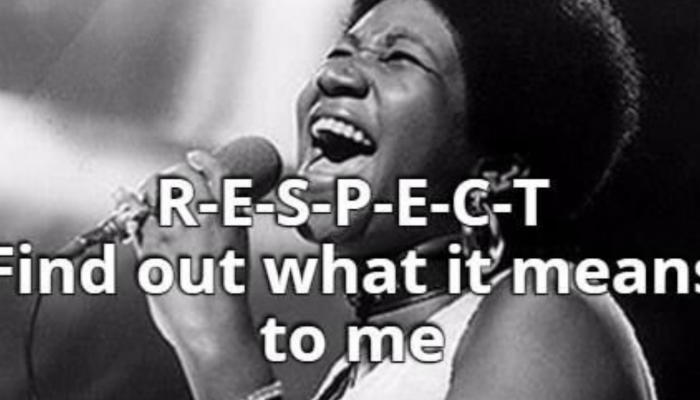Friday, 4 p.m. We are in our usual training room. Everybody’s excited the working week is coming to an end.
The moment we mention the topic of our current research and ask our group to complete a brief questionnaire, several delegates inevitably begin humming the popular 1967 tune: “R-E-S-P-E-C-T / Find out what it means to me”. It’s all laughter. Thank you, Aretha Franklin!
50 years later, we’re still pondering on this powerful word and its true meaning: what does it mean to us? In what ways does the concept of courtesy mean something different? How much of both do we expect and give? And do men and women, young and less young, share the same opinions?
Our initial study proved so surprising and insightful, that we decided to refine our research.
“What it means to me”
We analysed the definitions of ‘respect’ and ‘courtesy’ given by a sample of 167 contact centre advisors from a UK Government Agency.
Courtesy
As previously identified, the concept of courtesy is straightforward and well understood. There are no doubts the first word that springs to mind when we think about courtesy is ‘polite’. This reflects the dictionary definition of showing politeness. So far, so good.
Respect
When it comes to respect, things become more complicated.
Overall, the delegates in our sample identified the main aspects of respect as treating others fairly, or understanding and appreciating others’ opinions and views. These definitions are rather divergent from the actual meaning of admiring someone for their abilities, qualities or achievements.
Given the discrepancy between the actual and perceived meaning of respect, this time we also looked for any differences in the definitions given by men and women.
Some gender differences came to the surface: in the definitions given by women, there’s a greater emphasis on words such as ‘feelings’, ‘empathy’ and ‘listening’, which are hardly readable on men’s word cloud.
This shouldn’t come as a surprise: research on gender differences in language has long shown that female communication tends to include more emotional references than men’s, and that it chiefly revolves around feelings. So it’s expected this is also visible in women’s definitions of respect.
Nonetheless, the core of the definition remains inaccurate – from both sides. Words that we’d expect to read in the dictionary definition of respect, such as admiration for someone’s skills, are virtually unmentioned. Some synonyms (like high-regard and appreciation) are present to a much lesser degree, especially in male definitions.
Which would you rather receive?
Next, we went on to carefully examine what people say they’d rather receive from the companies they deal with. From past studies, we anticipated it was respect. This probably has to do with the widespread distorted interpretation of the concepts of respect and courtesy.
But are there any variations between men and women, or in terms of age?
Although both men and women in all age groups claim they’d prefer to receive respect over courtesy, courtesy becomes increasingly more desirable with age, for both sexes.
What’s more, on average across all age groups, courtesy is more significant for women (30%) than for men (23%).
Interestingly, while 18-to-24-year-old men disclose a strong preference for respect (94%), women over 45 years of age score the highest percentage on want for courtesy (47%).
A generational gap seems to emerge: young people are not overly concerned with good manners, and would rather have their opinions recognised and appreciated. This is particularly evident in young men. However, the older generations are not willing to completely give in: women in particular still expect and appreciate good manners.
What can companies learn?
In today’s increasingly competitive market place, there’s more pressure than ever on providing an excellent customer service, increasing sales, and reducing complaints. All of this links to a greater discourse on loyalty, trust, and of course profitability.
So what do these results on respect and courtesy mean for companies?
Organisations might think courtesy and politeness are commercial imperatives. And indeed they are. But the discerning customers of the 21st century also want something else from the companies they deal with: R-E-S-P-E-C-T.
In the 1960s, Aretha Franklin sang about respect “Find out what it means to me”. Today, we’ve come to understand that, from a consumer’s perspective, the denotation and connotation of respect don’t correspond. For customers, respect also implies being treated fairly, listened to, and ultimately feeling that their opinions are being understood and valued.
This highlights the need for companies to adapt the way they talk and write to the changing needs of modern customers, and to further tailor these to different sexes and age groups.
Back to Blog
